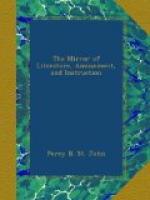driven out by the maid sweeping away the dirt, and
were forced to walk about until she had finished, and
lighted the fire, when we ordered our breakfast; but
how much better would it have been to have taken our
breakfast comfortably on board, and then to have come
on shore, especially as we had no money to spare.
Next to being too late, being too soon is the worst
plan in the world. However, we had our breakfast,
and paid the bill; then we sallied forth, and went
up George Street, where we found all sorts of vehicles
ready to take us to the fair. We got into one
which they called a dilly. I asked the man who
drove us why it was so called, and he replied because
he only charged a shilling. O’Brien, who
had joined us after breakfasting on board, said that
this answer reminded him of one given to him by a
man who attended the hackney-coach stands in London.
“Pray,” said he, “why are you called
Watermen?” “Watermen,” replied the
man, “vy, sir, ’cause ve opens the hackney-coach
doors.” At last, with plenty of whipping,
and plenty of swearing, and a great deal of laughing,
the old horse, whose back curved upwards like a bow,
from the difficulty of dragging so many, arrived at
the bottom of Portdown hill, where we got out, and
walked up to the fair. It really was a most beautiful
sight. The bright blue sky, and the coloured
flags flapping about in all directions, the grass so
green, and the white tents and booths, the sun shining
so bright, and the shining gilt gingerbread, the variety
of toys and variety of noise, the quantity of people
and the quantity of sweetmeats; little boys so happy,
and shop people so polite, the music at the booths,
and the bustle and eagerness of the people outside,
made my heart quite jump. There was Richardson,
with a clown and harlequin, and such beautiful women,
dressed in clothes all over gold spangles, dancing
reels and waltzes, and looking so happy! There
was Flint and Gyngell, with fellows tumbling over
head and heels, playing such tricks—eating
fire, and drawing yards of tape out of their mouths.
Then there was the Royal Circus, all the horses standing
in a line, with men and women standing on their backs,
waving flags, while the trumpeters blew their trumpets.
And the largest giant in the world, and Mr. Paap,
the smallest dwarf in the world, and a female dwarf,
who was smaller still, and Miss Biffin, who did every
thing without legs or arms. There was also the
learned pig, and the Herefordshire ox, and a hundred
other sights which I cannot now remember. We walked
about for an hour or two, seeing the outside of every
thing: we determined to go and see the inside.
First we went into Richardson’s, where we saw
a bloody tragedy, with a ghost and thunder, and afterwards
a pantomime, full of tricks, and tumbling over one
another. Then we saw one or two other things,
I forget which, but this I know, that generally speaking,
the outside was better than the inside. After
this, feeling very hungry, we agreed to go into a




